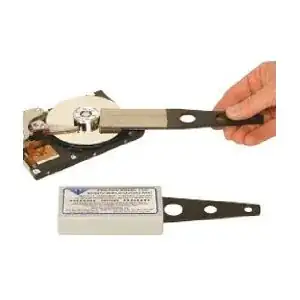For completeness, there's always demagnetizing. Look for degaussers. You can also get a bunch of magnets and hope that scrambles enough of your data.
NSA approved degaussing wands appear to run about $500 - $600.

There are some vague forum reports of buying very strong neodymium magnets and using those to degauss the drive by rubbing it on both sides:
I got the idea of using a permanent magnet to erase the drive but I read many postings of people who tried but failed using old speaker magnets. I then found a site called K&J Magnetics (http://www.kjmagnetics.com/) which sells super strong neodymium rare earth magnets.
I did some experiments on an extra working drive. The neodymium magnets fully erased a hard drive with less then 30 sec of rubbing in circles on both sides of the drives. They also worked great to erase 3-1/2" floppy disks and some flash memory cards.
Just be careful to read and heed the warnings about the magnets on K&J's site. The magnets are much stronger than you could imagine. Getting your finger caught between two magnets will cause a serious pinch. Also they are incredibly hard to get apart once they stuck together.
Looking through the magnet selection, one of the larger neodymium magnets will run you from $5-$20 so that's much more cost effective, if it works. However, according to their own blog, which performed an actual experiment on a live hard drive, this doesn't work at all! Per the comments, this might be because simple magnets don't offer the rapidly oscillating magnetic field that the commercial degaussers do.
So, pending any other experiments, I'd call the cheaper neodymium magnets busted; it's either the $500-$600 degaussing wand, or nothing.
